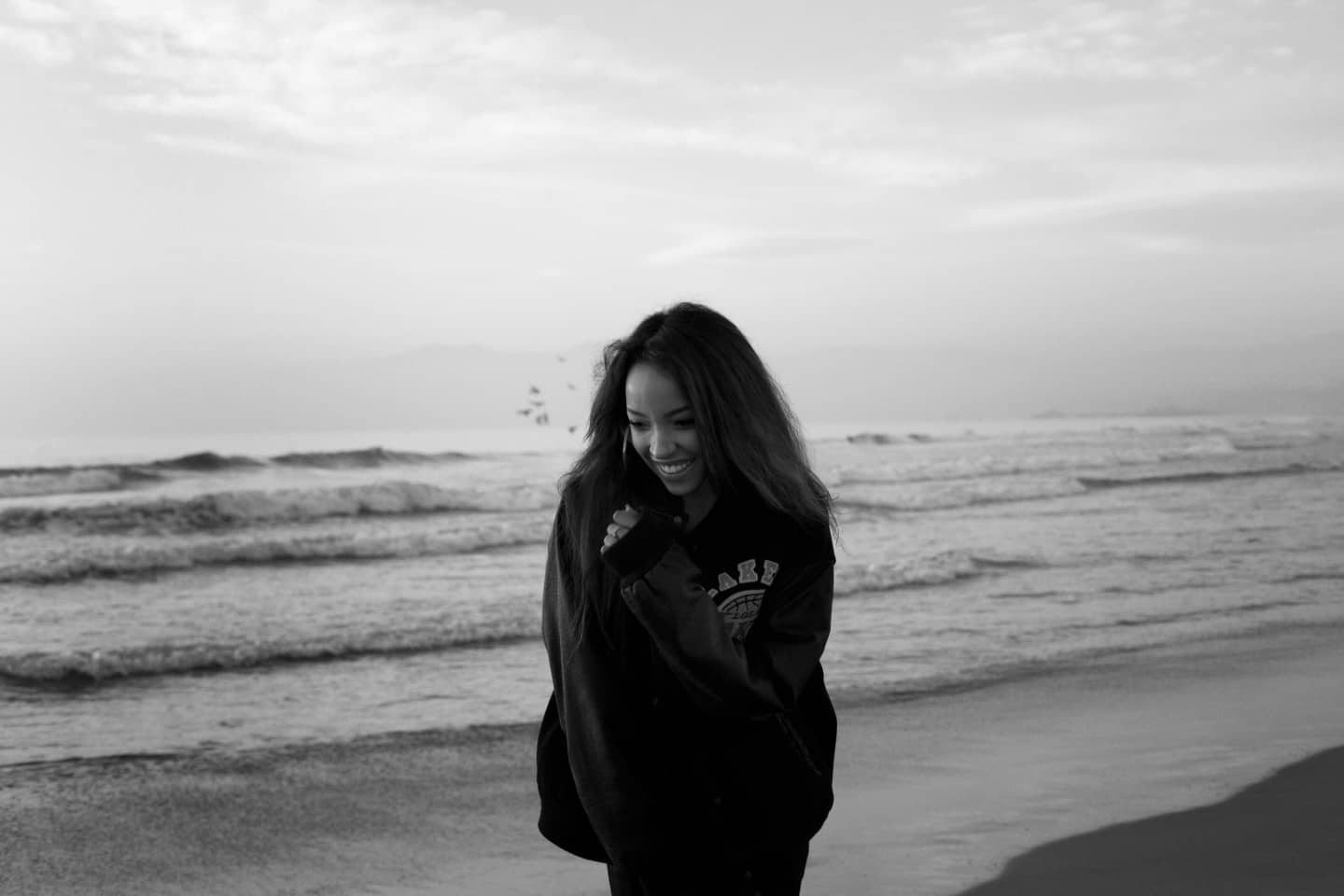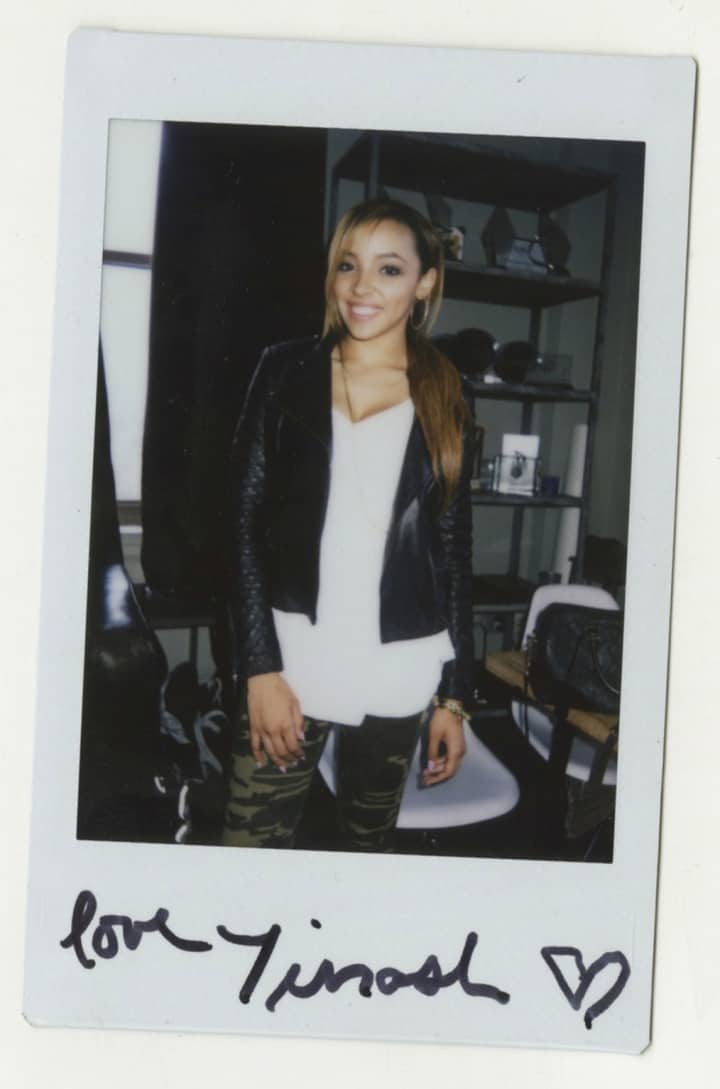
Interview: Tinashe On Blowing Up And Being Compared To Beyoncé
Groomed for pop, sharpened by grind, a young singer struggles to define success on her own terms.
Tinashe's runaway success seems like a no-brainer. A pretty face and a cute voice that bounces around a beat from the summer's hottest producer—girls scream, guys sweat, wash, rinse, repeat. It's the oldest trick in pop's playbook, and it's worked: starting with her breakout hit, "2 On," the 21-year-old has emerged as a critical darling and prominent force on pop radio. But in conversation, Tinashe comes off as complex as the deeper cuts on her debut album Aquarius—she's polished without question, but also unafraid to offer an idea that may strike a bit left of center. She spoke to The FADER about blowing up, taking control, and the pressures of putting on a show.
It's kind of sexy right now to bash major labels and say, "Oh, I do everything myself." You've released music on your own, but you benefitted tremendously from a major label breaking your record. Yeah, I have the inside scoop on both sides. Record labels—it can go one of two ways: It can be a really positive thing for you, or it can be a really negative thing, because you are contractually obligated to them and there's a lot of people with their own opinions. If they aren't aligned with your opinions, then there’s a lot of tension. So I can understand why they can have a very bad reputation. The key for me was just to get a record label that already believed in what I was doing and respected me enough, as an artist, that they wanted to know my perspective, as opposed to telling me what to do. Record labels are definitely a huge asset, You just have to make the right decision when you do sign that record label, not just sign with the first person who gives you a check.
You'd turned deals down? Yeah, I wasn't thirsty for a deal because I had already been signed to a major when I was in a girl group. I was doing the solo thing, and I did love the independence of just being able to drop stuff whenever I wanted. Like you said, it's kind of sexy to be independent. So I wasn't keen to get rid of that. But when I connected with RCA and they showed a really, really, really genuine understanding and belief in me, I was like, OK this could be something.
What was starting Aquarius like? I still remember the first session was with T-Minus. It was the end of 2012. I knew I was working on it because they were putting me into the big studios and with big producers, right off the bat. That was a big shift from what I was used to, because I was creating all of my music on my own, in my room. It took me a good eight months to get comfortable with working with other creative people. Also, it took a little bit for other producers to get to know who I was and where I was coming from. They didn't know I had a perspective—especially when you're a new artist, and young, and they have hits, it's like, “Why should I listen to you? I know what to do, you don't know what to do.”
Did you still do some of this album on your own, in your room? Yeah. "Aquarius," "Bet," and "Cold Sweat" were completely recorded at my home studio, and a lot of parts of tracks were recorded there, too. I just wanted to stay true to what I had created.
The New York Times ran a glowing review of your album that said you and Beyoncé are pretty much the only female voices in a male-dominated era of R&B. That's really bugged because R&B has traditionally been the main outlet for female voices in urban music. Why do you think it’s different now? I think more recently, they honed in on this idea that there can only be, like, one, or two female artists. Which really doesn't make sense to me because there's a million male artists that look the same, sound the same, make the same music, and nobody cares about that. But you can't be a fan of Tinashe and Beyoncé, you can't be a fan of Rihanna and Tinashe, you have to pick one or the other. Like, why can't you just be a fan of both?
The navy, the hives… Yeah, exactly. It's very segregated and I don't know what that's about, but hopefully that will change.
In your episode of At Home With, you talked about living with your family. You still live at home with them? That keeps me so grounded. Even though I can tell my life has really changed, I don't feel like it's really changed. I feel like it's just all the same stuff but it's a lot more going on. It's always nice because when you travel so much and then to come back and feel like you're at home and have people around you that you love. It's nice. So I'm not in a rush to leave. Especially because I'm so busy, why pay for an apartment I'm not even at?
Your dad is an immigrant from Zimbabwe, and I know the children of immigrants often feel torn between two worlds. No, I think it helped me. The fact that he started from nothing and then was able to make something of his life, it gave my parents the attitude that life is short, let's just go. Let's support her, let's see what can happen. Let's move to LA. Let's drop everything and leave all our family behind because if you don't try, who knows? If you don't take that leap of faith, then you never know [what] your life could become. I highly doubt when he was a kid that he thought that his life would turn out the way that it has.
Do your younger siblings know what's going on? Oh yeah. My brother wore a Tinashe T-shirt to school today. He gets to play songs during the lunch hour and he said he's going to play my whole album. They are so supportive.
If you're Tinashe's little brother and you DJ at lunch, you've got to be the man in the hallways. Yeah, he's on homecoming court this year and everything. He's living this year, it's his senior year. I like being able to be in their lives. And that's an awesome thing that I've been able to do, to be around for so much of their teenage years. I could have moved out of the house at 18, but I'm really close with them.
Did you feel any pressure, like your family was banking on your career? The only time I ever felt pressure was when like when my family was really struggling financially, like really struggling financially because we lived in LA, and they were there because of me. I was just like, I want to help, but I'm not bringing any money to the table right now, because I'm in grind mode, you know? But I never felt pressure from them to be successful. They never put that on me, or never made me feel any type of way about it at all.
That comes across on your album. You sing about feeling weighed down. Yeah, "Cold Sweat" touches on pressures in the industry. Now I feel more pressure than ever before—well, not now because the albums out, but when I was making the album. It's just to be successful, and you don't know what that is, so that's a really hard goal to chase because there is no defining moment where it's like, "Oh, you did this. You're a success." You know?
And the reward for that success is more work. Higher goals, higher stakes. It just continues and it continues. I don't really know what success will necessarily mean for me, but I still just want to be successful.
 Photo by Scott Perry
Photo by Scott Perry
What I like a lot about you is that you're still regular. [Laughs] Not jaded by the industry.
In your lane, everything is extra glam, extra performance. That's the job of a pop star, to present this show and be that glam girl. How is it balancing that? There's always elements of putting on a performance and putting on a show. You have to step up to that. But people have connected with me because I haven’t tried to seem too clean cut and polished. There's something to be said for being like a real person. I've always connected to artists whose music is coming from a legitimate place.
Who are some of those artists that you've felt that about? It's why I connect so much to indie/alternative music. I can feel that the writing was coming from a real place, like Bon Iver and The Yeah Yeah Yeahs as opposed to like the super label-made contrived stuff. That's why I want to be able to have a balance.
Have you written or produced anything for other artists, or is that something that you’d like to do? Not consciously for other artists. I've got so many songs now that I don't want that I would not be opposed to giving to other artists. I'd like to do that in the future, but I've just been so focused on this album and this music, that all 200 songs that I wrote over the course of the last few years were initially intended for me.
I'd heard a story about a song that you had done with Detail that ended up on J.Lo's album. How’d that play out? Yeah, “I Luh Ya Papi.” That was interesting because we had the song, we recorded it, and Detail played it for J. Lo. It wasn’t “Papi” at first, it was “I Luh You Nigga.” [laughs] Like, I luh ya luh ya luh ya nigga. They switched the swag up a little bit. I had the whole song, it was intended for the album and everything. And then Detail was in a session with J. Lo and he played her the track because you know these producers sometimes, they’re like, “Yo, lemme play you my hot shit!” I guess she obviously really liked it, and she cut her version, and one day Detail calls me and is like “B-T-dubs, J. Lo is singing that song.” I didn’t believe it at first, I thought he was just not trying to give it to me for some reason. I was like, “J. Lo does not want that song, she’s not gonna sing that.” And then it came out. I guess she wanted it. I wasn’t tripping on it too much. I really roll with the punches. A lot of things happen for a reason. Timing always is perfect, even when you don’t think it is. I clearly wasn’t meant to have that song. Who knows, “2 On” might not have existed if I did the other song.